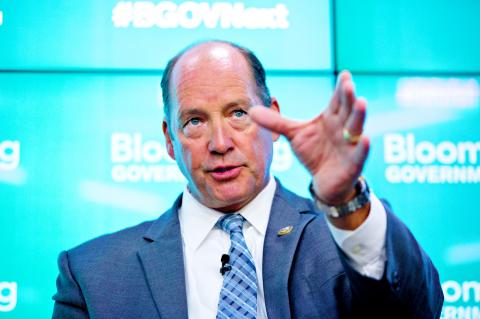US support for Taiwan to participate in next year’s World Health Assembly (WHA) meeting as an observer must be met with supporting action by the Taiwanese government, former Ministry of Health and Welfare representative to Geneva Chang Wu-hsiu (張武修) said.
Chang’s comments referred to the support of other subcommittee members regarding a bill introduced by US Representative Ted Yoho, who chairs the US House of Representatives Foreign Affairs Subcommittee on Asia and the Pacific. The bill was unanimously passed on Thursday.
The bill aims to improve the US strategy for promoting Taiwan’s participation in the WHO, and instructs the US secretary of state to report on the US Department of State’s efforts to obtain observer status for Taiwan at the WHA.

PHOTO: Bloomberg
Yoho said international health concerns should not be limited to national borders, and it was unfortunate that China has taken a shortsighted view and barred Taiwan from participating in international organizations.
Public health should not become an issue of political football and the US should continue to support Taiwan’s participation in the WHO, US Representative Gerald Connolly added.
Chang said that alternative methods of medical and health cooperation between Taiwan and the US should be explored.
“There are too many things that could be done,” Chang said. “Opportunity must be backed up with action.”
With Taiwan’s high standard of medical quality and wide healthcare coverage, it could cooperate with the US and other countries to make the nation more visible on the international stage, but such a commitment does not have to be centered around politics, Chang said.
Taiwan could offer medical training to other nations, develop a market for medical products, or even invest in hospitals abroad, expanding Taiwan’s renown and capability through actual work, he added.
The government and private sectors must ensure that Taiwan is invited to the next WHA, Taipei-based Foundation of Medical Professionals Alliance executive director Lin Shih-chia (林世嘉) said.
Meanwhile, the Ministry of Foreign Affairs thanked the subcommittee for its support, saying that such action was in line with constant support from the US administrative and legal branches supporting the nation’s participation in international organizations.
Support for the bill shows that support for Taiwan’s participation in international organizations transcends major political parties, the ministry said, adding that it would follow developments of the bill and lobby for support and aid from all bodies.
Taiwan had hoped to attend this year’s WHA in Geneva, Switzerland, from May 22 to May 31 as an observer, as it had done for the past eight years, but it did not receive an invitation because of opposition from China.
Taiwan first attended the WHA as an observer in 2009, a year after former president Ma Ying-jeou (馬英九) came to power and began pursuing a more conciliatory policy toward Beijing.
Taiwan’s exclusion was widely seen as part of China’s efforts to clamp down on Taiwan’s international participation, a strategy that has become more aggressive since President Tsai Ing-wen (蔡英文) came to power last year.
Additional reporting by CNA

The manufacture of the remaining 28 M1A2T Abrams tanks Taiwan purchased from the US has recently been completed, and they are expected to be delivered within the next one to two months, a source said yesterday. The Ministry of National Defense is arranging cargo ships to transport the tanks to Taiwan as soon as possible, said the source, who is familiar with the matter. The estimated arrival time ranges from late this month to early next month, the source said. The 28 Abrams tanks make up the third and final batch of a total of 108 tanks, valued at about NT$40.5 billion

Travel agencies in Taiwan are working to secure alternative flights for travelers bound for New Zealand for the Lunar New Year holiday, as Air New Zealand workers are set to strike next week. The airline said that it has confirmed that the planned industrial action by its international wide-body cabin crew would go ahead on Thursday and Friday next week. While the Auckland-based carrier pledged to take reasonable measures to mitigate the impact of the workers’ strike, an Air New Zealand flight arriving at Taipei from Auckland on Thursday and another flight departing from Taipei for Auckland on Saturday would have to

A group from the Taiwanese Designers in Australia association yesterday represented Taiwan at the Midsumma Pride March in Melbourne. The march, held in the St. Kilda suburb, is the city’s largest LGBTQIA+ parade and the flagship event of the annual Midsumma Festival. It attracted more than 45,000 spectators who supported the 400 groups and 10,000 marchers that participated this year, the association said. Taiwanese Designers said they organized a team to march for Taiwan this year, joining politicians, government agencies, professionals and community organizations in showing support for LGBTQIA+ people and diverse communities. As the first country in Asia to legalize same-sex

MOTIVES QUESTIONED The PLA considers Xi’s policies toward Taiwan to be driven by personal considerations rather than military assessment, the Epoch Times reports Chinese President Xi Jinping’s (習近平) latest purge of the Chinese People’s Liberation Army (PLA) leadership might have been prompted by the military’s opposition to plans of invading Taiwan, the Epoch Times said. The Chinese military opposes waging war against Taiwan by a large consensus, putting it at odds with Xi’s vision, the Falun Gong-affiliated daily said in a report on Thursday, citing anonymous sources with insight into the PLA’s inner workings. The opposition is not the opinion of a few generals, but a widely shared view among the PLA cadre, the Epoch Times cited them as saying. “Chinese forces know full well that